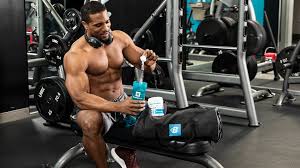In a recent commentary published in the Journal of Adolescent Health, experts emphasize the importance of primary care, family medicine, and mental health clinicians routinely asking adolescent and young adult patients about their use of muscle-building supplements such as protein or creatine. This recommendation comes in light of growing concerns about the safety and necessity of these supplements among young people.
Muscle-building supplements, unlike pharmaceutical drugs, are not subjected to pre-market testing. They have been associated with higher rates of death and disability in adolescents compared to vitamin supplements like A, C, and Folate. Even though protein shakes or creatine gummies might seem harmless, the necessary nutrients for muscle growth are often adequately provided by a balanced diet, rendering supplements unnecessary.
“For many young people, particularly boys, use of these supplements is pretty ubiquitous,” stated Kyle Ganson, PhD, MSW, an assistant professor of social work at the University of Toronto and the commentary’s author. Ganson’s research reveals that over 80% of adolescent boys and young men take a protein supplement, and up to 50% use creatine. However, many health clinicians may be unaware of this usage due to a lack of inquiry.
When clinicians discover a teenager or young adult is using dietary supplements, they should adopt a harm reduction approach. This involves encouraging the reduction or modification of supplement use rather than advocating for total abstinence. Michele LaBotz, MD, the medical director of the Master of Science in Athletic Training program at the University of New England, suggests that counseling patients on the financial waste of supplements and the effectiveness of a healthy diet and regular exercise in muscle development is more effective in reducing supplement use.
Open communication about supplement use can also lead to discussions about more dangerous substances, such as muscle-building steroids. Ganson notes that some teens might transition to these more harmful products if they feel supplements are no longer effective. Continuous support and medical monitoring are crucial in these situations.
Ganson and his colleagues are advocating for professional societies to develop formal clinical practice guidelines regarding muscle-building supplements for teens and young adults.
Contaminated and Dangerous Supplements
Teenage boys, particularly athletes, are at significant risk from deceptive labeling and contamination of muscle-building supplements. LaBotz, who has authored recommendations for the American Academy of Pediatrics, advises young athletes to rely on proper nutrition and training instead of supplements.
Pieter Cohen, MD, associate professor at Harvard Medical School and an internist at the Cambridge Health Alliance, warns that terms like “proprietary,” “blend,” or “complex” on supplement labels should be red flags. These terms often obscure the actual ingredients and quantities in the product, which can sometimes include harmful substances not approved for use in the United States.
The US Food and Drug Administration does not have the authority to assess the safety of dietary supplements before they hit the market. This lack of regulation has resulted in an estimated 23,000 emergency room visits annually in the United States due to adverse effects from dietary supplements, including cardiac issues and swallowing difficulties.
Cohen suggests that supplements with fewer than six ingredients and those certified by a third party are generally safer. The Department of Defense offers a scorecard to help consumers identify safer supplements.
“American consumers are the lab rats for these products,” said Bryn Austin, ScD, SM, a professor of social sciences at the Harvard TH Chan School of Public Health and director of a program that trains health professionals to prevent eating disorders. “This industry invests a lot of money to invent a health halo for themselves. Muscle-building supplements can be downright dangerous and will not turn anyone into the elite athlete of their dreams.”
Clinicians are urged to stay vigilant and proactive in discussing supplement use with their teenage patients to mitigate potential health risks and promote safer, healthier alternatives for muscle building.











